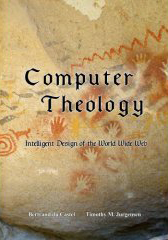PRESS
COMPUTER THEOLOGY |
||||
|
one extreme
and duty as the other, then we can draw a parallel to other social orders. If
we consider the extreme spectrum of apprehension ranging to terror we find the
basis of trust in despotic regimes. In any case, it is the level of this state
of altered consciousness that determines our degree of trust in the cognitive
concepts associated with it. The secret of religion’s success as a social
structure is in simultaneously evoking a similar feeling of trust in all the
members of a group. While it may not be a feeling of the same intensity, it can
be a distribution of uniformly directed trust among all individuals in the
group toward a common policy. What then is the source of this trust? Religion seeks
to draw a common foundation of trust for its adherents from a source outside
the realm of physical experience. This forms the primary differentiation
between religions and other social structures. As we will consider in greater detail
in subsequent chapters, with specific emphasis in Chapter 7, trust can derive
from causality. Religions, particularly theistic religions, establish basic
causality from beyond natural sources; by supernatural
means. Causality validation is in turn based on perceived results, a statement
that we will expand on in Chapter 9. Did the believed causality lead to an
ostensibly better understood outcome than might otherwise have been
anticipated? Can successful predictions of perceived future outcomes be based
on this causality? If trust derived from a supernatural source can thus be
reasonably established, then a second order question to be addressed is, “How
does policy derive within the infrastructure of trust that springs from this
source?” With religion, the answer is virtually always through the same
mechanism; from a shaman who acts as
the intermediary between the source of trust and the specification of policy.
In this manner, policy is established that determines the basis for subsequent
interactions. The source and mechanisms of trust on which policy depends
typically include the establishment of identity for the individuals who are
subject to these policy specifications, including the rules governing
interactions and the consequences of these interactions. The shaman, often
acting under the guise of prophet or lawgiver, becomes the source of policy
under the auspices of the source of trust. Simply stated, God dictates the laws
to the prophets and the prophets convey the law to the believers. From this
point on, all social structures behave in essentially the same manner. Trust
and policy infrastructure may elicit different effects, but the mechanisms are
much the same. Illustrative of
our contention that theology is, in fact, about trust and policy are the
circumstances of at least one of the great schisms
of the This diminution
often results in a subsequent reformulation of policy or perhaps in the
creation of a whole new basis of trust. We view a schism as essentially an
evolutionary process periodically encountered in social structures of all
forms. In the Western World, the Protestant Reformation was such a schism and
was most certainly about trust and policy. It was formulated by arguably one of
the great policy wonks of any age, the erstwhile priest Martin Luther. Working
from within the most powerful policy infrastructure of the day, the clergy of
the Roman Catholic Church, he challenged the very precepts of that
infrastructure. He questioned how both trust and policy were established, how
trust was conveyed, how policy was implemented, the consequences of adherence
or abrogation of policy, and the very boundaries of the trust and policy infrastructures.
Consequently, he brought into question the details of the Church’s policy
predicated upon the basis of trust originally established by the Church, and in
so doing he incited a stark repudiation of that policy. Martin Luther was a German monk described by Will and Ariel Durant in The Story of Civilization, from which we derive much of the following discussion, as an earthy man. He was |
||||
|
||||
© Midori Press, LLC, 2008. All rights reserved for all countries. (Inquiries) The contents of ComputerTheology: Intelligent Design of the World Wide Web are presented for the sole purpose of on-line reading to allow the reader to determine whether to purchase the book. Reproduction and other derivative works are expressly forbidden without the written consent of Midori Press. Legal deposit with the US Library of Congress 1-33735636, 2007.
|
ComputerTheology Intelligent Design of the World Wide Web Bertrand du Castel and Timothy M. Jurgensen Midori Press, Austin Texas 1st Edition 2008 (468 pp) ISBN 0-9801821-1-5 |
Book available at Midori Press (regular) |
